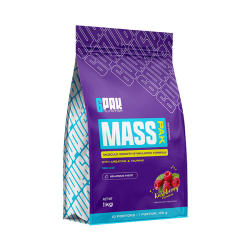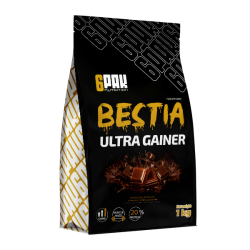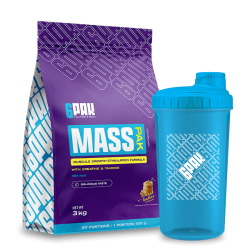-
Kategorie
-
-
-
-
ODŻYWKI I SUPLEMENTY
-
-
-
-
ZDROWIE I WITAMINY
-
-
-
-
-
-
AKCESORIA
-
-
-
-
NASZE LINIE PRODUKTÓW
-
-
-
-
Podkategorie
Odżywki na masę (gainery)
BESTIA Ultra Gainer - Odżywka na masę
MASS PAK - Gainer z kreatyną - 3 kg + Shaker GRATIS!
Kiedy intensywna aktywność fizyczna to za mało
Każdy z nas, bez względu na rodzaj prowadzonej aktywności fizycznej, powinien pamiętać o odpowiednio zbilansowanej diecie. Nie ważne, czy są to treningi siłowe, wytrzymałościowe, czy wydolnościowe - odpowiednia podaż składników odżywczych powinna być uzależniona od rodzaju i intensywności treningu, a także od stopnia zaawansowania. A co robić, kiedy pełnowartościowa dieta i trening to za mało, aby osiągnąć zamierzone cele? Kiedy nie widzisz postępów w budowaniu swojej masy mięśniowej, albo trudno jest Ci przybrać na wadze? Wpadasz w panikę, bo popularne hasło "najpierw masa, potem rzeźba" w ogóle się u Ciebie nie sprawdza? Zastanawiasz się "co na masę mięśniową", albo "co na przyrost mięśni"? A może czas na zwiększenie kaloryczności swojej diety, kiedy prowadzisz intensywne treningi? Co powiesz na odżywkę węglowodanowo-białkową?
Gainer, czyli odżywka węglowodanowo-białkowa
Gainer to produkt, który jest połączeniem węglowodanów i białek z wyższą zawartością węglowodanów (ok. 60-70%). Na rynku suplementów diety dostępne są też odżywki typu bulk, które cechują się mniej więcej równą zawartością węglowodanów i białek1. Odżywki węglowodanowo-białkowe często są wzbogacane np. o dodatek witamin, składników mineralnych, kreatyny, czy też aminokwasów.
Po co spożywamy węglowodany?
Nie od dziś wiadomo, że spożycie węglowodanów jest wykorzystywane przez osoby aktywne fizycznie i sportowców w celu poprawy wyników sportowych poprzez dostarczanie substratu paliwowego2. A czym jest ten substrat paliwowy? Zacznijmy od tego, że węglowodany są magazynowane jako glikogen wątrobowy i mięśniowy. Glikogen to rozgałęziony polimer glukozy, w którym komórki przechowują i wykorzystują glukozę w celu zaspokojenia swoich potrzeb energetycznych. Glikogen mięśniowy jest głównym źródłem energii podczas długotrwałych ćwiczeń o umiarkowanej do wysokiej intensywności. Rozwój zmęczenia podczas wyczerpujących ćwiczeń jest często związany z niskimi stężeniami glikogenu w mięśniach3. Dlatego też przyjęcie strategii żywieniowych, które zapewniają, że zapasy glikogenu mięśniowego są dobrze zaopatrzone przed treningiem i zawodami, pomaga opóźnić zmęczenie4. Warto na to zwrócić uwagę, ponieważ niewystarczająca ilość węglowodanów, aby w pełni uzupełnić zapasy glikogenu w mięśniach, może prowadzić do spadku wydajności, szczególnie w przypadku regularnego wykonywania forsownych ćwiczeń5.
Węglowodany a wydolność i większa intensywność ćwiczeń
Jak już wiesz, podczas ćwiczeń o wysokiej intensywności węglowodany stają się głównym substratem energetycznym, a zatem wyczerpanie glikogenu jest uważane za ważny czynnik ograniczający wydajność. Wysoka dostępność egzogennych węglowodanów podczas wysiłku (czyli około 78–90 g/h) ułatwia wydolność m. in. poprzez oszczędzanie glikogenu wątrobowego, a także przez utrzymanie wysokiego tempa utleniania węglowodanów, co umożliwia większą intensywność ćwiczeń. Z tego powodu, aby osiągnąć wysoki poziom wydajności podczas ćwiczeń opartych na ścieżce glikolitycznej (czy to oporowych, czy wytrzymałościowych), wskazane byłoby rozpoczęcie ćwiczeń z pełnymi zapasami glikogenu, a także dostarczanie węglowodanów podczas wysiłku2.
Dlaczego węglowodany w diecie osób aktywnych fizycznie są ważne?
Adaptacyjna reakcja na trening zależy od rodzaju wykonywanego wysiłku i zastosowanego obciążenia treningowego (np. czasu trwania, częstotliwości intensywności), ale także od innych czynników, takich jak stan odżywienia. Dlatego tak dużo mówi się o tym, jak ważna jest właściwie skomponowana dieta osób aktywnych. Tak więc przyjmowanie składników odżywczych może modulować adaptacje wywołane wysiłkiem fizycznym. Dostępność energii podczas ćwiczeń moduluje fizjologiczną odpowiedź na trening. Obecnie glikogen jest uważany nie tylko za substrat energetyczny, ale także za regulator szlaków sygnałowych regulujących adaptacje w odpowiedzi na wysiłek. Zatem manipulowanie endogenną (magazynami glikogenu) i egzogenną (odpowiednie spożycie) dostępnością węglowodanów przed i/lub po sesjach treningowych może być wykorzystana do zmiany adaptacji wywołanych wysiłkiem fizycznym2.
Gainer to zwykle połączenie różnych rodzajów węglowodanów
Chodzi tutaj o węglowodany wolno i szybko przyswajalne. Nie wszystkie źródła węglowodanów dostarczają energię lub są trawione i wchłaniane w tym samym tempie. Na przykład szybciej trawiona i wchłaniana jest glukoza, sacharoza, maltoza czy maltodekstryna, natomiast fruktoza i galaktoza wykazują wolniejsze tempo wchłaniania. Tempo z jakim źródło węglowodanów przedostaje się do krwiobiegu, przed i podczas ćwiczeń może mieć wpływ na intensywność i czas trwania ćwiczeń. Mówiąc prościej produkty o wysokiej zawartości węglowodanów, które mają tendencję do szybkiego wchłaniania, najlepiej dostarczają mięśniom energii, której potrzebują podczas ćwiczeń do utrzymania ich sprawności. Należy pamiętać też o ważnym dla naszych mięśni czasie po treningu- zalecenia żywieniowe dla sportowców wytrzymałościowych rekomendują wysoką dostępność węglowodanów w celu regeneracji powysiłkowej, aby uzupełnić zapasy glikogenu2,3,5.
Dlaczego gainer to połączenie węglowodanów i białek?
Powszechnie wiadomo, że spożywanie odpowiedniej ilości białka w diecie ma kluczowe znaczenie dla utrzymania optymalnego zdrowia, wzrostu, rozwoju i funkcjonowania przez całe życie. Zapotrzebowanie na białko w diecie jest podyktowane głównie masą ciała i beztłuszczową masą ciała, a także bilansem energetycznym netto i oczywiście aktywnością fizyczną. A co nam daje spożywanie białka? Wielkość poposiłkowej stymulacji syntezy białek mięśniowych, zahamowanie rozpadu białek mięśniowych (i całego ciała) oraz przejście do dodatniego bilansu białkowego jest zależne właśnie od zawartości białka w diecie, jego jakości oraz formie w jakiej jest spożywane (np. posiłek z mieszanymi makroskładnikami odżywczymi, wyizolowany suplement w postaci nienaruszonej białka lub aminokwasy w wolnej postaci). Zwiększone spożycie białka przyczynia się m. in. do większego przyrostu siły i masy mięśniowej w połączeniu z ćwiczeniami oporowymi, pozwala na większe zachowanie masy mięśniowej, gdy jest spożywane w okresach ujemnego bilansu energetycznego oraz (w mniejszym stopniu) zapewnia większą odpowiedź syntezy białek mięśniowych, gdy jest równomiernie rozłożone w posiłkach6. Warto pamiętać, że białko przyczynia się do wzrostu masy mięśniowej i pomaga w jej utrzymaniu oraz pomaga w utrzymaniu zdrowych kości7.
Gainer od 6PAK Nutrition
MASS PAK, ponieważ o nim tutaj mowa - to idealna kombinacja węglowodanów (maltodekstryna i glukoza) oraz białka (koncentrat białka serwatkowego). W produkcie znajduje się również kreatyna oraz tauryna i L-glicyna. To idealny wybór, jeśli szukasz gainera z kreatyną. MASS PAK dostępny jest w pięciu pysznych smakach i trzech wariantach: 1 kg, 3 kg i 5 g. Bądź zawsze gotowy na intensywny trening!
Literatura:
- Grzebisz N., Żywność funkcjonalna w diecie sportowców, KNUV 2017; 2 (55): 237-246.
- Mata F., Valenzuela P. L., Gimenez J., Tur C., Ferreria D., Domínguez R., Sanchez-Oliver A. J., Martínez Sanz J. M., Carbohydrate Availability and Physical Performance: Physiological Overview and Practical Recommendations. Nutrients, 2019, May 16;11(5):1084.
- Kloby Nielsen L. L., Tandrup Lambert M. N., Jeppesen P. B., The Effect of Ingesting Carbohydrate and Proteins on Athletic Performance: A Systematic Review and Meta-Analysis of Randomized Controlled Trials. Nutrients, 2020, May 20;12(5):1483.
- Williams C., Rollo I., Carbohydrate Nutrition and Team Sport Performance. Sports Medicine, 2015, Nov;45 Suppl 1(Suppl 1):S13-22.
- Kanter M., High-Quality Carbohydrates and Physical Performance: Expert Panel Report. Nutrition Today, 2018, Jan;53(1):35-39.
- Carbone J. W., Pasiakos S. M., Dietary Protein and Muscle Mass: Translating Science to Application and Health Benefit. Nutrients, 2019, May 22;11(5):1136.
- Rozporządzenie Komisji (UE) NR 432/2012 z dnia 16 maja 2012 r. ustanawiające wykaz dopuszczonych oświadczeń zdrowotnych dotyczących żywności, innych niż oświadczenia odnoszące się do zmniejszenia ryzyka choroby oraz rozwoju i zdrowia dzieci.
Sprzedającym jest Trec Nutrition spółka z ograniczoną odpowiedzialnością z siedzibą w Gdyni, ul. Śmidowicza 48, 81-127 Gdynia, wpisaną do rejestru przedsiębiorców pod numerem KRS 0000315748, NIP: 9581602454, numer REGON 220696468
Copyright © 2025. Trec Nutrition Sp. z o.o... All rights reserved
check_circle
check_circle






